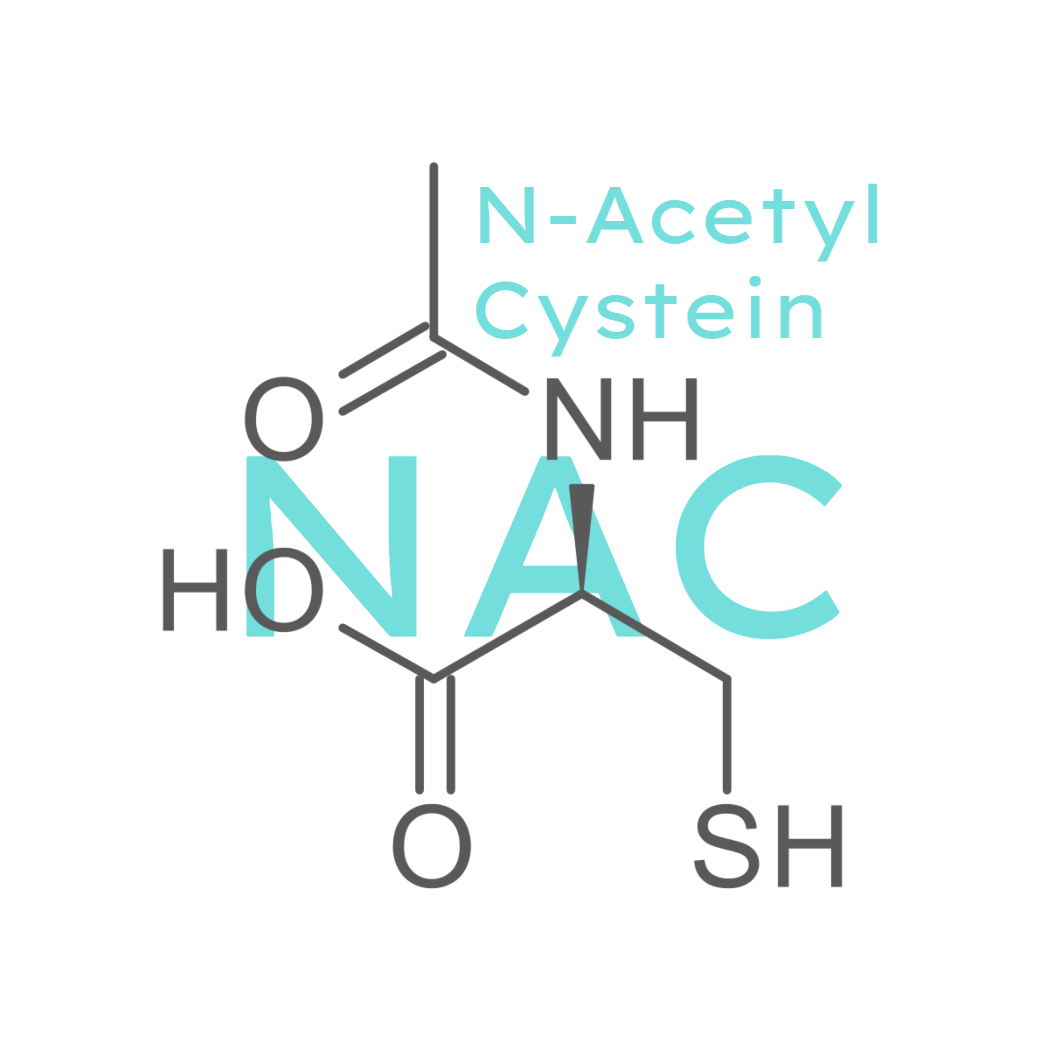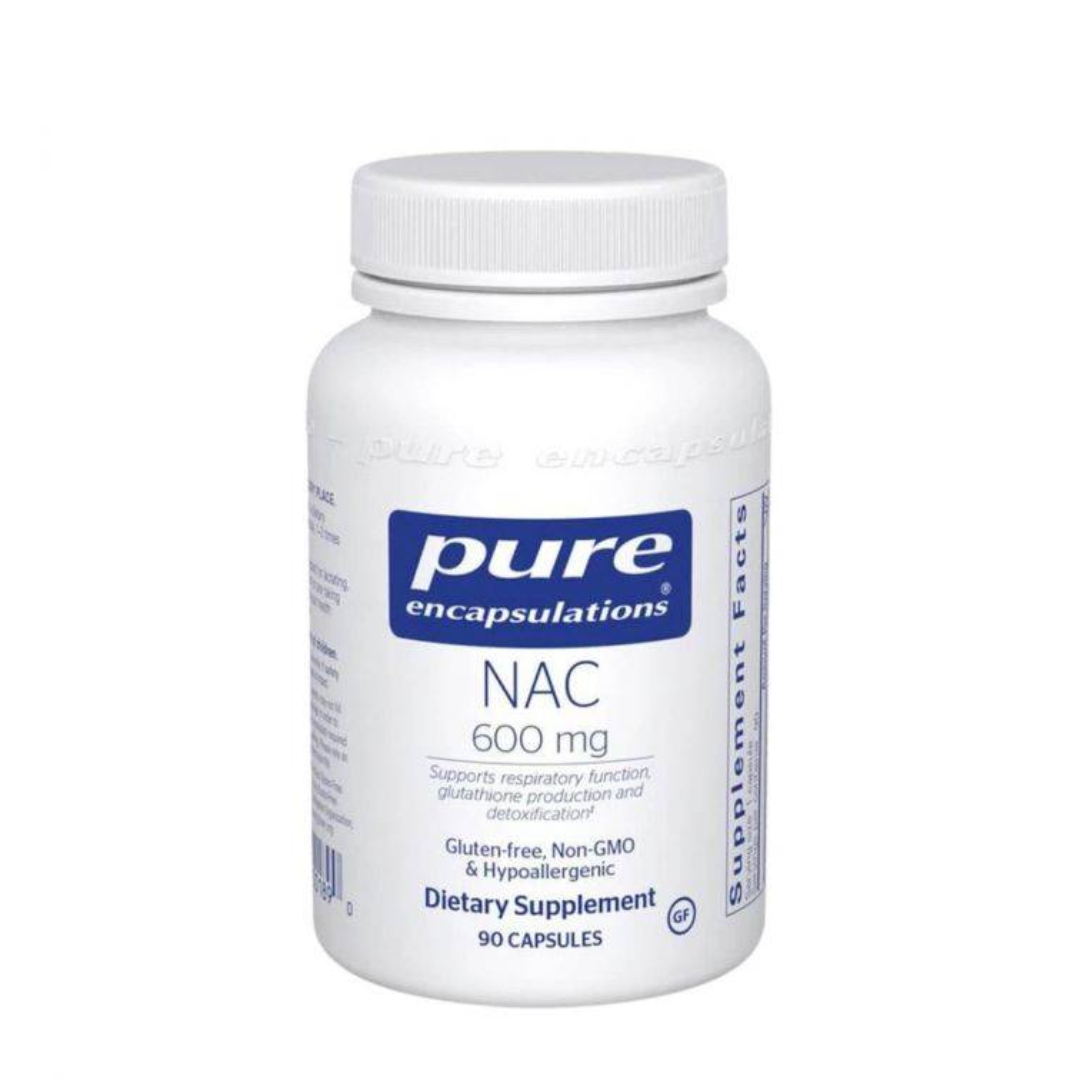
N-Acetyl-L-Cysteine (NAC) is one of the most exciting antioxidant amino acids of our time. An anti-inflammatory agent, one of the precursors to glutathione, which referred to as a master antioxidant (1). That is why we recommend the combined use of our NAC and Glutathione products.
The mucolytic, antitussive effect of NAC has long been known in the health circles because of its ability to break down disulfide bridges in mucus and secretions (1).
New research has highlighted other important aspects: its effects on stabilizing blood sugar levels (2) (insulin resistance, adjusting blood fat levels), increasing fertility and protecting the nervous system have innovative potential.
N-Acetyl-Cystein
The versatile antioxidant amino acid
N-Acetyl Cystein the glutathione precursor
“The glutathione precursor” what does it mean? Glutathione, also known as GSH, is a molecule found naturally in your body. It is produced by the liver and nerve cells in the central nervous system. Glutathione is made up of three amino acids: L-cysteine, glycine, and L-glutamate.
Glutathione is an antioxidant, a molecule that helps fight free radicals. When more free radicals exist than antioxidants, oxidative cell damage occurs. This can lead to inflammation and a variety of health issues.
In addition to being an antioxidant,
Acetyl-L-Cysteine (NAC) is one of the most exciting antioxidant amino acids of our time. An anti-inflammatory agent, one of the precursors to glutathione, which referred to as a master antioxidant [1].
A Powerful Antioxidant
N-acetylcysteine, derived from the simple amino acid cysteine, provides significant protection against a broad array of modern toxins.
NAC is a precursor of glutathione. Glutathione is the body’s most important antioxidant, found in every single cell. It is also called a “master antioxidant” because it exerts its effects within cells and its unique ability to maximize the effects of all other antioxidants, including vitamins C and E, Q + Ubiquinol, r-alpha-lipoic acid.
The primary function of Glutathione is to protect cells and mitochondria from the damaging, destructive effects of internal oxidation processes (2). It protects the integrity of our cells, tissues and organs, thus playing an important role in the fight against chronic diseases associated with aging. Glutathione is key to detoxification, neutralizing toxins in the body, protecting against the harmful effects of radiation, chemicals and environmental contaminants.
It improves the functioning of the immune system, has a nervous system protection effect, increases the body’s resistance to infections, can speed up the recovery from diseases, and increases the body’s energy levels and vitality (3).
For a healthy immune system
Glutathione plays an important role in maintaining the healthy functioning of the immune system. Oxidative stress caused by viral infections causes inflammation in the cells and glutathione levels are demonstrably reduced.
Decreased immunity and an increased risk of infections are associated with low glutathione levels (4). Glutathione is beneficial in increasing the number of T cells in immune leukocytes and NK cells in natural killer cells (5). Glutathione deficiency can be detected in autoimmune diseases.
Research has shown that glutathione has a positive effect on the normal functioning of the immune system and prevents the development of an excessive immune response and inflammation in autoimmune diseases (6).
Liver protection, detoxification
Glutathione is found in the highest concentrations in the liver and kidneys. The liver plays a prominent role in the II. in phase detoxification processes (7). Helps remove toxins, foreign chemicals, potential carcinogens, hormones, pollutants.
It converts them into water-soluble substances that can now be easily excreted from the body through the kidneys. Glutathione is also present in the entire intestinal mucosa, where it captures and neutralizes potential toxins before they are absorbed into the body. Glutathione protects the intestinal wall, which, if weakened, can lead to a leaking / permeable intestinal problem (8).
The detoxification ability of glutathione can be further enhanced by other sulfur-containing molecules: cruciferous plants (broccoli), r-alpha-lipoic acid, N-acetyl cysteine, turmeric, St. John’s wort and B vitamins, selenium, and the like.
Excessive consumption of over-the-counter drugs containing paracetamol (eg, antipyretics, analgesics, etc.) can lead to hepatotoxicity and deplete the body’s glutathione system. NAC is able to rehabilitate toxic processes in liver cells.
Acetyl-L-Cysteine increases the body’s glutathione levels, enhances the immune system through its antioxidant effect, helps cellular regeneration and reduce inflammation, and contributes to the effective elimination of toxins and toxins.
It contributes to the multi-level detoxification processes of the liver, and also promotes the rehabilitation of liver cells in the state of fatty liver. In this case, Choline and Inositol can help in the detoxification process.
Protecting the brain and nervous system
Our brain uses a lot of oxygen and is therefore extremely vulnerable to oxidative damage. This oxidative damage adversely affects neurological functions and our development, which can lead to mitochondrial dysfunction and a number of neurodegenerative diseases. Glutathione protects brain cells against odiation.
Low glutathione levels increase the risk of developing neurodegenerative diseases. Heavy metals that accumulate in the brain can cause severe oxidative stress and cell damage. Glutathione has the ability to detoxify toxic metals in the brain, thereby protecting the health of the nervous system (9).
Energy production of cells, enhancement of vitality
Mitochondria are responsible for the energy production of our cells in the form of adenosine triphosphate (ATP). The function of mitochondria also plays a vital role in cell health, intercellular communication, regulated cell death, and cell growth.
Researchers today believe that mitochondrial health is directly linked to our aging processes and the resistance of cells to degenerative diseases. Glutathione has the potential to improve mitochondrial health and directly affect our energy-producing abilities.
By-products of cellular metabolism are also free radicals that are destructive. They are also able to neutralize glutathione (10).
NAC in relation to the hormonal system and fertility
Research results support its effectiveness in reducing ROS (reactive oxygen species) levels, combined with vitamins A, E and Omega-3 fatty acids. Other literature has also described the combination of NAC and selenium as effective (11). High ROS levels presuppose inflammation and affect the DNA of sperm.
It supports the ovarian cycle, i.e. the cycle of ovulation, thereby positively affecting fertility (12). By stimulating glutathione levels, it has a positive effect on insulin secretion and increases insulin sensitivity, so it can be used as an adjunct in the treatment of insulin-resistant conditions in polycystic ovary syndrome, which is closely related to insulin resistance (13).
Furthermore, a human study highlights the effect of NAC on cysts that cure-like use of NAC may reduce the potential for cysts due to endometriosis (14). In such cases, I strongly recommend Glutathione, Choline + Inositol.
The role of NAC in the functioning of the respiratory system
As a mutolytic, Acetyl-L-Cysteine supports the emptying of difficult-to-break secretions and can therefore help with prolonged, persistent coughs (colds, flu, bronchitis (15).
Research has been shown to be effective in the adjunctive treatment of COPD [8]. Due to its powerful antioxidant effect, it can reduce the condition of chronic inflammation. According to the research, Acetyl-L-Cysteine intake promoted physical activity and performance in patients with COPD.
By increasing glutathione levels, it can reduce the inflammatory state of lung tissue and contribute to its regeneration.
What else does NAC help
- To clean the lungs of the secretion due to smoking.
- In the adjunctive treatment of COPD
- Prevention of respiratory infections, alleviation of pre-existing symptoms (persistent cough)
- Endometriosis, in the adjunctive treatment of PCOs for fertility problems (both women and men)
- In post-contraceptive rehabilitation (in such cases we also recommend our Broccoli & Watercress, Choline & Inositol products)
- To detoxify the liver, regenerate liver cells, lower triglycerides In case of blood sugar and insulin homeostasis problems, in the adjunctive treatment of insulin resistance
- Nervous system, to support nerve cells and to increase memory
- Metabolism of toxins and cancer-causing substances
- Natural creation and repair of DNA
- Production of protein and prostaglandin, a compound with hormone-like effects
- Activation of enzymes
- Glutathione also helps with the breakdown of nutrients and the regulation of important body processes, such as the immune response.
- A small study published in Medical Science Monitor in 2011 shows a connection between low glutathione levels and autism spectrum disorders.
- The mucolytic, antitussive effect of NAC has long been known in the health circles because of its ability to break down disulfide bridges in mucus and secretions .
- It is also used as an antidote in problems with paracetamol overdose to protect liver cells.
- New research has highlighted other important aspects: its effects on stabilizing blood sugar levels (insulin resistance, adjusting blood fat levels), increasing fertility and protecting the nervous system have innovative potential.
- N-acetylcysteine (NAC) is effective both in inhibiting biofilm formation and in destroying developed biofilms. (12)
Resources
- [1] Aldini G, Altomare A, Baron G, Vistoli G, Carini M, Borsani L, Sergio F. N-Acetylcysteine as an antioxidant and disulphide breaking agent: the reasons why. Free Radic Res. 2018 Jul;52(7):751-762
- [2] Samuni Y, Goldstein S, Dean OM, Berk M. The chemistry and biological activities of N-acetylcysteine. Biochim Biophys Acta. 2013 Aug;1830(8):4117-29.
- [3] Fulghesu AM, Ciampelli M, Muzj G, et al. N-acetyl-cysteine treatment improves insulin sensitivity in women with polycystic ovary syndrome. Fertil Steril. 2002 Jun;77(6):1128-35.
- [4] Safarinejad MR, Safarinejad S. Efficacy of selenium and/or N-acetyl-cysteine for improving semen parameters in infertile men: a double-blind, placebo controlled, randomized study. J Urol. 2009 Feb;181(2):741-51.
- [5] Badawy A, State O, Abdelgawad S. N-Acetyl cysteine and clomiphene citrate for induction of ovulation in polycystic ovary syndrome: a cross-over trial. Acta Obstet Gynecol Scand. 2007;86(2):218-22.
- [6] Porpora MG, Brunelli R, Costa G, Imperiale L, Krasnowska EK, Lundeberg T, Nofroni I, Piccioni MG, Pittaluga E, Ticino A, Parasassi T. A promise in the treatment of endometriosis: an observational cohort study on ovarian endometrioma reduction by N-acetylcysteine. Evid Based Complement Alternat Med. 2013;2013:240702.
- [7] Stey C, Steurer J, Bachmann S, Medici TC, Tramèr MR. The effect of oral N-acetylcysteine in chronic bronchitis: a quantitative systematic review. Eur Respir J. 2000 Aug;16(2):253-62.
- [8] Stav D, Raz M. Effect of N-acetyl cysteine on air trapping in COPD: a randomized placebo-controlled study. Chest. 2009 Aug;136(2):381-6.
- [9] Mokhtari V, Afsharian P, Shahhoseini M, Kalantar SM, Moini A. A Review on Various Uses of N-Acetyl Cysteine. Cell J. 2017;19(1):11-17. doi:10.22074/cellj.2016.4872
- [10] Sandhir R, Sood A, Mehrotra A, Kamboj SS. N-Acetylcysteine reverses mitochondrial dysfunctions and behavioral abnormalities in 3-nitropropionic acid-induced Huntington’s disease. Neurodegener Dis. 2012;9(3):145-57.
- [11] Shungu DC. N-acetylcysteine for the treatment of glutathione deficiency and oxidative stress in schizophrenia. Biol Psychiatry. 2012 Jun 1;71(11):937-8.
- [12] https://pubmed.ncbi.nlm.nih.gov/25339490/


